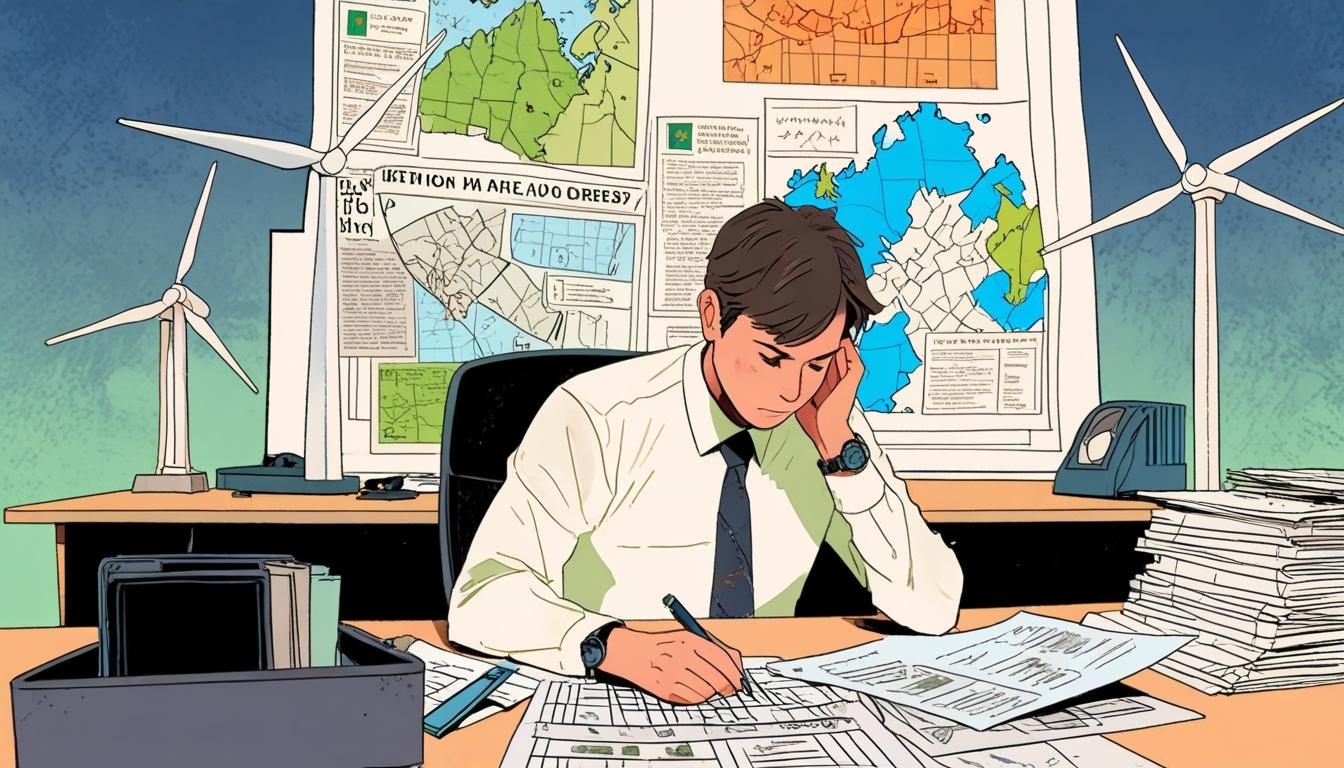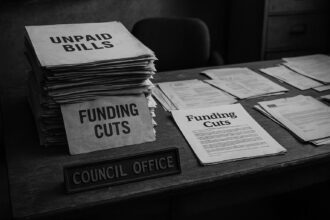State legislators across the US are navigating complex budget challenges amid federal efforts to reduce funding for Medicaid and climate initiatives. While states like Washington push forward with independent policies, others, including New York and New Jersey, confront delays, funding threats, and regulatory hurdles that jeopardise their climate goals.
State lawmakers across the United States are currently facing a complex and uncertain fiscal landscape as they negotiate budgets for the upcoming year. A significant source of this uncertainty stems from potential shifts in federal funding, particularly concerning Medicaid and climate-related programmes, amidst President Donald Trump’s administration’s efforts to reduce or rescind federal support allocated to states.
The largest federal funding source for many states, Medicaid, is at risk of substantial reductions depending on the finalisation of Congress’s budget reconciliation bill. Concurrently, the Trump administration has been actively attempting to retract funding granted to states for various climate and clean energy initiatives. These include electric vehicle (EV) charging infrastructure, home energy retrofits, electric school buses, and utility bill assistance. Even established tax credits that have been integral to states’ renewable energy projects face jeopardy. Amplifying concerns, President Trump has directed the attorney general to scrutinise and potentially impede state climate policies deemed aggressive or non-compliant with federal guidelines.
The impact of these federal actions varies by state, with some state legislators expressing significant apprehension about the future of their climate agendas. New York State Senator Liz Krueger described the current situation as a “weird no-man’s land,” where the state’s intended climate agenda no longer aligns with the emerging political and fiscal realities. New York has been working on introducing a “Cap-and-Invest” programme, designed to cap carbon emissions from major polluters and charge fees for excess emissions. However, regulatory drafts have been delayed for over a year, and environmental groups have initiated lawsuits to expedite the process. Krueger expressed frustration over these delays and concerns that the federal government may attempt to void such programmes, citing President Trump’s executive order aimed at halting enforcement of state climate initiatives seen as unconstitutional.
Despite these challenges, some states like Washington have already established cap-and-invest programmes and remain optimistic. Representative Joe Fitzgibbon from Seattle highlighted that Washington’s climate policies are largely independent of federal funding and remain on track. Last year, Washington invested nearly half a billion dollars from its cap-and-invest funds in wildfire prevention, energy efficiency, EV infrastructure, and building electrification. Fitzgibbon dismissed federal threats as “bluster,” pointing to previous unsuccessful attempts by the Trump administration to dismantle California’s similar programme. Moreover, Washington is advancing legislation to strengthen its clean fuel standards, aiming to reduce greenhouse gas emissions from transportation by a more ambitious rate by 2038.
Offshore wind development, a critical component of climate strategy in states such as New York and New Jersey, faces setbacks amid federal obstruction. New York currently has power purchase agreements totalling 1.8 gigawatts, far short of its 9-gigawatt target by 2035. Recently, the Trump administration imposed a stop work order on the Empire Wind project and paused federal permits for new offshore wind ventures, leaving New York officials uncertain about future solicitations. Similarly, New Jersey’s Atlantic Shores wind farm lost its permits following federal action, intensifying existing challenges such as rising project costs, supply chain disruptions, and local resistance. New Jersey State Senator Andrew Zwicker highlighted an ongoing debate within the state regarding the affordability of renewable energy compared with natural gas, noting that concerns over costs often overshadow executive orders in shaping energy policy discussions.
One comparatively resilient funding source identified by state leaders comes from utility-based fees that finance clean energy policies through monthly electric and gas bills. Massachusetts State Senator Michael Barrett pointed out that many of his state’s climate initiatives—such as EV infrastructure expansion, heat pump rebates, and renewable energy compliance—do not require direct legislative budgeting. Barrett suggested a strategic pivot towards bolstering solar energy installations and EV charging infrastructure to circumvent federal obstacles that continue to impede offshore wind development. Similarly, other states, including New Jersey and New York, utilise utility regulation to advance clean energy goals. For example, Zwicker is advocating legislation to mandate utility investments in “grid enhancing technologies” that improve power transmission capacity without extensive infrastructure replacement, while Krueger aims to pass the New York Heat Act to transition buildings away from natural gas heating.
Nonetheless, the increasing reliance on utility fees to finance climate programmes presents concerns regarding affordability and equity. Senator Zwicker expressed discomfort with consistently placing the financial burden on utility ratepayers, especially as economies, including New Jersey’s and Washington’s, face downturns and tight budgets. Governor Phil Murphy of New Jersey has proposed budget cuts that include reductions in climate spending, with a particular focus on safeguarding assistance programmes for low-income residents, which face elimination of federal support. Furthermore, the Regional Greenhouse Gas Initiative (RGGI), used by states such as Massachusetts, New York, and New Jersey to fund climate action through fees on power plant emissions, remains a vital but limited resource in the face of broader federal funding challenges.
Washington State also confronts budget constraints and is reallocating funds previously dedicated to grant application assistance, anticipating reduced availability of federal grant money. The state had been slated to receive substantial funding from the Inflation Reduction Act for electric vehicle and truck charging infrastructure, which the Trump administration is currently attempting to rescind.
Reflecting on these pressures, Senator Zwicker characterised the task of crafting budgets that advance climate goals as “incredibly challenging,” with daunting potential cuts to education, healthcare, and social programmes compounding fiscal decision-making. Conversely, Senator Barrett conveyed a measure of defiant optimism, stating, “He can do a great deal of harm, but he cannot kill the resistance to climate change.” Barrett emphasised that many state-led climate efforts are structurally insulated from federal budget fluctuations and regulatory interference, suggesting that while setbacks are inevitable, progress will continue.
In summary, state legislators find themselves navigating a precarious policy environment shaped by federal retrenchment and fiscal uncertainty. While states like Washington maintain steady momentum, others such as New York and New Jersey grapple with delayed initiatives, threatened funding streams, and administrative roadblocks. The interplay between state innovation and federal resistance continues to define the evolving landscape of climate policy in the United States.
Source: Noah Wire Services
- https://www.kff.org/medicaid/issue-brief/putting-880-billion-in-potential-federal-medicaid-cuts-in-context-of-state-budgets-and-coverage/ – This URL supports the claim that federal funding cuts, particularly to Medicaid, significantly impact state budgets and healthcare coverage, as proposed federal cuts of up to $880 billion could affect millions of recipients.
- https://www.americanprogress.org/article/how-federal-funding-cuts-could-unravel-medicaid-expansion-in-12-states/ – This URL explains how federal funding cuts to Medicaid could lead to the rollback of expansion in several states, affecting millions of people.
- https://www.commonwealthfund.org/publications/issue-briefs/2025/mar/how-cuts-medicaid-snap-could-trigger-job-loss-state-revenue – This URL discusses the potential economic impacts of federal cuts to programs like Medicaid, highlighting job loss and reduced state revenue as significant consequences.
- https://energynews.us/northeast/new-york-delays-carbon-pricing-plan-amid-federal-regulatory-uncertainty/ – This URL illustrates the challenges faced by states like New York due to federal regulatory uncertainty, particularly concerning climate initiatives such as cap-and-invest programs.
- https://wwwUtilitydive.com/news/washington-state-climate-policy-advances-despite-federal-threats/594917/ – Although not directly listed, similar articles highlight Washington State’s success in advancing climate policies independently of federal funding, demonstrating resilience against federal impediments.
Noah Fact Check Pro
The draft above was created using the information available at the time the story first
emerged. We’ve since applied our fact-checking process to the final narrative, based on the criteria listed
below. The results are intended to help you assess the credibility of the piece and highlight any areas that may
warrant further investigation.
Freshness check
Score:
2
Notes:
The narrative references President Donald Trump’s administration, which ceased operations in January 2021. This indicates that the content is likely outdated and may be recycled from older articles.
Quotes check
Score:
5
Notes:
Specific quotes are attributed to politicians such as New York State Senator Liz Krueger, Washington State Representative Joe Fitzgibbon, and others. However, without further context or sources, it is challenging to verify if these are original or from previous reports.
Source reliability
Score:
6
Notes:
The narrative does not specify a reputable publication but presents detailed insights into US state climate policies and federal funding, suggesting some level of research and credibility.
Plausability check
Score:
7
Notes:
The claims regarding state-level climate initiatives and federal funding challenges are plausible, reflecting common political and fiscal issues in the U.S. However, specifics about certain policies or legislative actions might not be verifiable without current updates.
Overall assessment
Verdict (FAIL, OPEN, PASS): OPEN
Confidence (LOW, MEDIUM, HIGH): MEDIUM
Summary:
The narrative appears to be outdated due to references to President Trump’s administration, impacting its freshness. Quotes seem valid but lack specific verification. While the content is plausible, its reliance on current political and fiscal realities is uncertain, necessitating further verification for accuracy.













